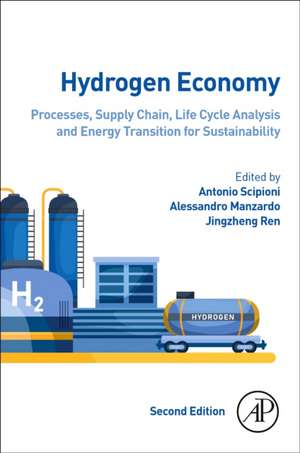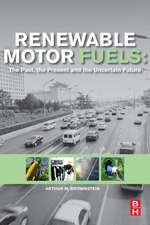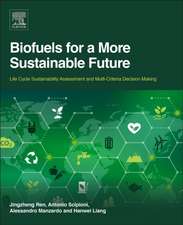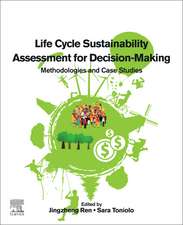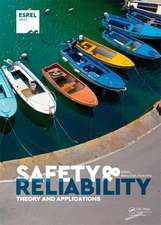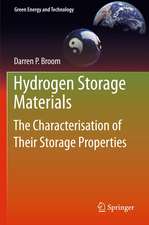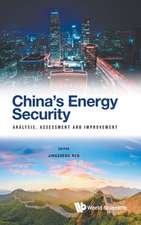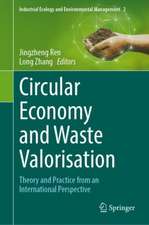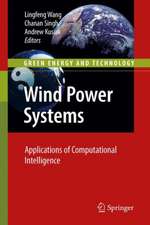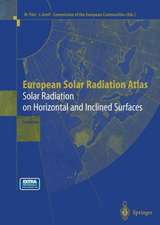Hydrogen Economy: Processes, Supply Chain, Life Cycle Analysis and Energy Transition for Sustainability
Editat de Antonio Scipioni, Alessandro Manzardo, Jingzheng Renen Limba Engleză Paperback – 19 ian 2023
This second edition of Hydrogen Economy is fully updated with new technologies and tools for design, optimization, assessment, and decision-making, and includes twelve new chapters divided into two new sections. Section III examines advanced hydrogen routines and technologies, including fuel cells and hybrid electric vehicles, new storage technologies, and biohydrogen production from waste, allowing for a more complete life cycle assessment of the entire supply chain. Section IV provides new insights into policy and future developments, discussing the role of Grey, Blue, and Green hydrogen in the energy transition, the application of hydrogen in decarbonization of heavy industry, hydrogen safety, and more, substantially broadening the scope of the 2nd Edition.
Providing a broad overview of the subject and well-recognized tools to manage hydrogen sustainability, Hydrogen Economy Second Edition is an invaluable resource for engineering researchers and PhD students in energy, environmental and industrial areas, energy economy researchers, practicing hydrogen energy engineers and technicians, energy and environmental consultants, life cycle assessment practitioners and consultants.
- Provides a broad perspective of the issues related to environmental, social and economic sustainability of hydrogen energy and its future perspectives
- Presents the current applied research and available tools for managing and assessing hydrogen energy sustainability, such as LCA, optimization, multi-criteria decision making and supply chain optimization
- Explores how experts in the field handle all issues related to the application of life cycle assessment for hydrogen production, storage, transport, distribution, safety, and end use
Preț: 809.15 lei
Preț vechi: 1055.71 lei
-23% Nou
Puncte Express: 1214
Preț estimativ în valută:
154.85€ • 168.14$ • 130.07£
154.85€ • 168.14$ • 130.07£
Carte tipărită la comandă
Livrare economică 15-29 aprilie
Livrare express 15-21 martie pentru 102.01 lei
Preluare comenzi: 021 569.72.76
Specificații
ISBN-13: 9780323995146
ISBN-10: 0323995144
Pagini: 660
Dimensiuni: 152 x 229 x 34 mm
Greutate: 0.87 kg
Ediția:2
Editura: ELSEVIER SCIENCE
ISBN-10: 0323995144
Pagini: 660
Dimensiuni: 152 x 229 x 34 mm
Greutate: 0.87 kg
Ediția:2
Editura: ELSEVIER SCIENCE
Public țintă
Hydrogen energy practitioners (engineers and technicians), engineering researchers and PhD students in Hydrogen energy and related environmental and industrial areas, energy economy researchersEnergy and environmental consultants, life cycle assessment practitioner and consultants
Cuprins
Part I: General
1. The role of Hydrogen Energy: Strengths, Weaknesses, Opportunities and Threats
Jingzheng Ren
2. Introduction of Hydrogen Routines
Di Xu
3. Critical Factors and Cause-Effect Analysis for Enhancing the Sustainability of Hydrogen Supply Chain
Jingzheng Ren
Part II: Design, Optimization, Assessment and Decision-making
4. Design and operation of hydrogen supply chains: a review on technology integration and system optimization
Catherine Azzaro-Pantel, Tchougoune Moustapha Mai and christian cristofari
5. Superstructure-based modelling for hydrogen supply chains: a review for capturing centralized vs. decentralized options
Renato Luise, Catherine Azzaro-Pantel and Annabelle Brisse
6. Life Cycle Cost Analysis of Hydrogen Energy Technologies
Antonella Petrillo
7. Life Cycle Assessment of Solid Oxide Fuel Cells and Polymer Electrolyte Membrane Fuel Cells: A Review
Alessandro Manzardo
8. Comparison of Different Multicriteria Decision-Making Methodologies for Sustainability Decision Making
Hanwei Liang
9. Sustainability Decision Support Framework for the Prioritization of Hydrogen Energy Systems
Jingzheng Ren
10. Hydrogen location selection and optimization: advanced models and behavioral evidence
Michael Kuby, Scott Kelley, Gil Tal and Andrew Martinez
11. Hydrogen production technologies: conventional processes
Abdalla Mohamed Ibrahim
Part III: Advanced hydrogen routines and technologies
12. Biohydrogen Production from Waste Substrates and Its Techno-Economic Analysis
Sankar Chakma and Pritam Kumar Dikshit
13. Proton Exchange Membrane Fuel Cells: Recent Advances, Modeling, and Future Trends
Francisco Jurado Melguizo, Wilian Paul Arévalo Cordero and Marcos Tostado-Véliz
14. Electrolyser Technologies for Hydrogen Economy
Sarbjit Giddey, Gurpreet Kaur, Mandar Risbud, Nawshad Haque, Dattatray S. Dhawale and Haijin Zhu
15. Hydrogen Safety, Risk, and Reliability Analysis
Katrina M. Groth and Ahmad Al-Douri
16. Safety of Hydrogen for Large-Scale Energy Deployment in a Decarbonized Economy
Chris LaFleur, Chris San Marchi, Ethan Hecht, Joseph Ronevich and Brian Ehrhart
17. Opportunities and Future Challenges in Hydrogen Economy for Sustainable Development
Yi Dou, Jingzheng Ren, Lu Sun and Liang Dong
Part IV: Policies and Perspective
18. Hydrogen Production Methods: Benefits, Opportunities, Costs, and Risks
Jinsoo Kim and Minyoung Yang
19. Power to hydrogen concepts for 100% renewable and sustainable energy systemsAndreas Poullikkas and Pavlos Nikolaidis
Part I: General
1. The role of Hydrogen Energy: Strengths, Weaknesses, Opportunities and Threats
Jingzheng Ren
2. Introduction of Hydrogen Routines
Di Xu
3. Critical Factors and Cause-Effect Analysis for Enhancing the Sustainability of Hydrogen Supply Chain
Jingzheng Ren
Part II: Design, Optimization, Assessment and Decision-making
4. Design and operation of hydrogen supply chains: a review on technology integration and system optimization
Catherine Azzaro-Pantel, Tchougoune Moustapha Mai and christian cristofari
5. Superstructure-based modelling for hydrogen supply chains: a review for capturing centralized vs. decentralized options
Renato Luise, Catherine Azzaro-Pantel and Annabelle Brisse
6. Life Cycle Cost Analysis of Hydrogen Energy Technologies
Antonella Petrillo
7. Life Cycle Assessment of Solid Oxide Fuel Cells and Polymer Electrolyte Membrane Fuel Cells: A Review
Alessandro Manzardo
8. Comparison of Different Multicriteria Decision-Making Methodologies for Sustainability Decision Making
Hanwei Liang
9. Sustainability Decision Support Framework for the Prioritization of Hydrogen Energy Systems
Jingzheng Ren
10. Hydrogen location selection and optimization: advanced models and behavioral evidence
Michael Kuby, Scott Kelley, Gil Tal and Andrew Martinez
11. Hydrogen production technologies: conventional processes
Abdalla Mohamed Ibrahim
Part III: Advanced hydrogen routines and technologies
12. Biohydrogen Production from Waste Substrates and Its Techno-Economic Analysis
Sankar Chakma and Pritam Kumar Dikshit
13. Proton Exchange Membrane Fuel Cells: Recent Advances, Modeling, and Future Trends
Francisco Jurado Melguizo, Wilian Paul Arévalo Cordero and Marcos Tostado-Véliz
14. Electrolyser Technologies for Hydrogen Economy
Sarbjit Giddey, Gurpreet Kaur, Mandar Risbud, Nawshad Haque, Dattatray S. Dhawale and Haijin Zhu
15. Hydrogen Safety, Risk, and Reliability Analysis
Katrina M. Groth and Ahmad Al-Douri
16. Safety of Hydrogen for Large-Scale Energy Deployment in a Decarbonized Economy
Chris LaFleur, Chris San Marchi, Ethan Hecht, Joseph Ronevich and Brian Ehrhart
17. Opportunities and Future Challenges in Hydrogen Economy for Sustainable Development
Yi Dou, Jingzheng Ren, Lu Sun and Liang Dong
Part IV: Policies and Perspective
18. Hydrogen Production Methods: Benefits, Opportunities, Costs, and Risks
Jinsoo Kim and Minyoung Yang
19. Power to hydrogen concepts for 100% renewable and sustainable energy systems
Andreas Poullikkas and Pavlos Nikolaidis
1. The role of Hydrogen Energy: Strengths, Weaknesses, Opportunities and Threats
Jingzheng Ren
2. Introduction of Hydrogen Routines
Di Xu
3. Critical Factors and Cause-Effect Analysis for Enhancing the Sustainability of Hydrogen Supply Chain
Jingzheng Ren
Part II: Design, Optimization, Assessment and Decision-making
4. Design and operation of hydrogen supply chains: a review on technology integration and system optimization
Catherine Azzaro-Pantel, Tchougoune Moustapha Mai and christian cristofari
5. Superstructure-based modelling for hydrogen supply chains: a review for capturing centralized vs. decentralized options
Renato Luise, Catherine Azzaro-Pantel and Annabelle Brisse
6. Life Cycle Cost Analysis of Hydrogen Energy Technologies
Antonella Petrillo
7. Life Cycle Assessment of Solid Oxide Fuel Cells and Polymer Electrolyte Membrane Fuel Cells: A Review
Alessandro Manzardo
8. Comparison of Different Multicriteria Decision-Making Methodologies for Sustainability Decision Making
Hanwei Liang
9. Sustainability Decision Support Framework for the Prioritization of Hydrogen Energy Systems
Jingzheng Ren
10. Hydrogen location selection and optimization: advanced models and behavioral evidence
Michael Kuby, Scott Kelley, Gil Tal and Andrew Martinez
11. Hydrogen production technologies: conventional processes
Abdalla Mohamed Ibrahim
Part III: Advanced hydrogen routines and technologies
12. Biohydrogen Production from Waste Substrates and Its Techno-Economic Analysis
Sankar Chakma and Pritam Kumar Dikshit
13. Proton Exchange Membrane Fuel Cells: Recent Advances, Modeling, and Future Trends
Francisco Jurado Melguizo, Wilian Paul Arévalo Cordero and Marcos Tostado-Véliz
14. Electrolyser Technologies for Hydrogen Economy
Sarbjit Giddey, Gurpreet Kaur, Mandar Risbud, Nawshad Haque, Dattatray S. Dhawale and Haijin Zhu
15. Hydrogen Safety, Risk, and Reliability Analysis
Katrina M. Groth and Ahmad Al-Douri
16. Safety of Hydrogen for Large-Scale Energy Deployment in a Decarbonized Economy
Chris LaFleur, Chris San Marchi, Ethan Hecht, Joseph Ronevich and Brian Ehrhart
17. Opportunities and Future Challenges in Hydrogen Economy for Sustainable Development
Yi Dou, Jingzheng Ren, Lu Sun and Liang Dong
Part IV: Policies and Perspective
18. Hydrogen Production Methods: Benefits, Opportunities, Costs, and Risks
Jinsoo Kim and Minyoung Yang
19. Power to hydrogen concepts for 100% renewable and sustainable energy systemsAndreas Poullikkas and Pavlos Nikolaidis
Part I: General
1. The role of Hydrogen Energy: Strengths, Weaknesses, Opportunities and Threats
Jingzheng Ren
2. Introduction of Hydrogen Routines
Di Xu
3. Critical Factors and Cause-Effect Analysis for Enhancing the Sustainability of Hydrogen Supply Chain
Jingzheng Ren
Part II: Design, Optimization, Assessment and Decision-making
4. Design and operation of hydrogen supply chains: a review on technology integration and system optimization
Catherine Azzaro-Pantel, Tchougoune Moustapha Mai and christian cristofari
5. Superstructure-based modelling for hydrogen supply chains: a review for capturing centralized vs. decentralized options
Renato Luise, Catherine Azzaro-Pantel and Annabelle Brisse
6. Life Cycle Cost Analysis of Hydrogen Energy Technologies
Antonella Petrillo
7. Life Cycle Assessment of Solid Oxide Fuel Cells and Polymer Electrolyte Membrane Fuel Cells: A Review
Alessandro Manzardo
8. Comparison of Different Multicriteria Decision-Making Methodologies for Sustainability Decision Making
Hanwei Liang
9. Sustainability Decision Support Framework for the Prioritization of Hydrogen Energy Systems
Jingzheng Ren
10. Hydrogen location selection and optimization: advanced models and behavioral evidence
Michael Kuby, Scott Kelley, Gil Tal and Andrew Martinez
11. Hydrogen production technologies: conventional processes
Abdalla Mohamed Ibrahim
Part III: Advanced hydrogen routines and technologies
12. Biohydrogen Production from Waste Substrates and Its Techno-Economic Analysis
Sankar Chakma and Pritam Kumar Dikshit
13. Proton Exchange Membrane Fuel Cells: Recent Advances, Modeling, and Future Trends
Francisco Jurado Melguizo, Wilian Paul Arévalo Cordero and Marcos Tostado-Véliz
14. Electrolyser Technologies for Hydrogen Economy
Sarbjit Giddey, Gurpreet Kaur, Mandar Risbud, Nawshad Haque, Dattatray S. Dhawale and Haijin Zhu
15. Hydrogen Safety, Risk, and Reliability Analysis
Katrina M. Groth and Ahmad Al-Douri
16. Safety of Hydrogen for Large-Scale Energy Deployment in a Decarbonized Economy
Chris LaFleur, Chris San Marchi, Ethan Hecht, Joseph Ronevich and Brian Ehrhart
17. Opportunities and Future Challenges in Hydrogen Economy for Sustainable Development
Yi Dou, Jingzheng Ren, Lu Sun and Liang Dong
Part IV: Policies and Perspective
18. Hydrogen Production Methods: Benefits, Opportunities, Costs, and Risks
Jinsoo Kim and Minyoung Yang
19. Power to hydrogen concepts for 100% renewable and sustainable energy systems
Andreas Poullikkas and Pavlos Nikolaidis
